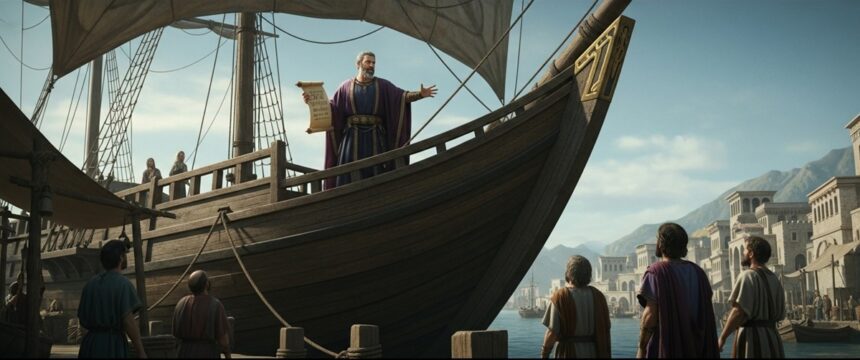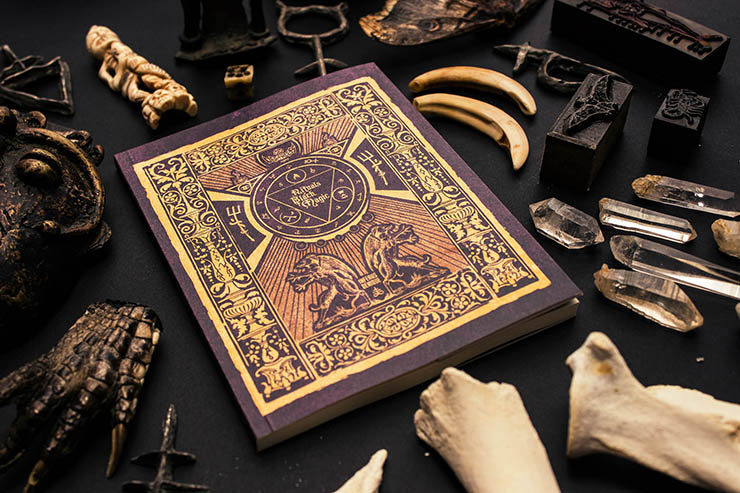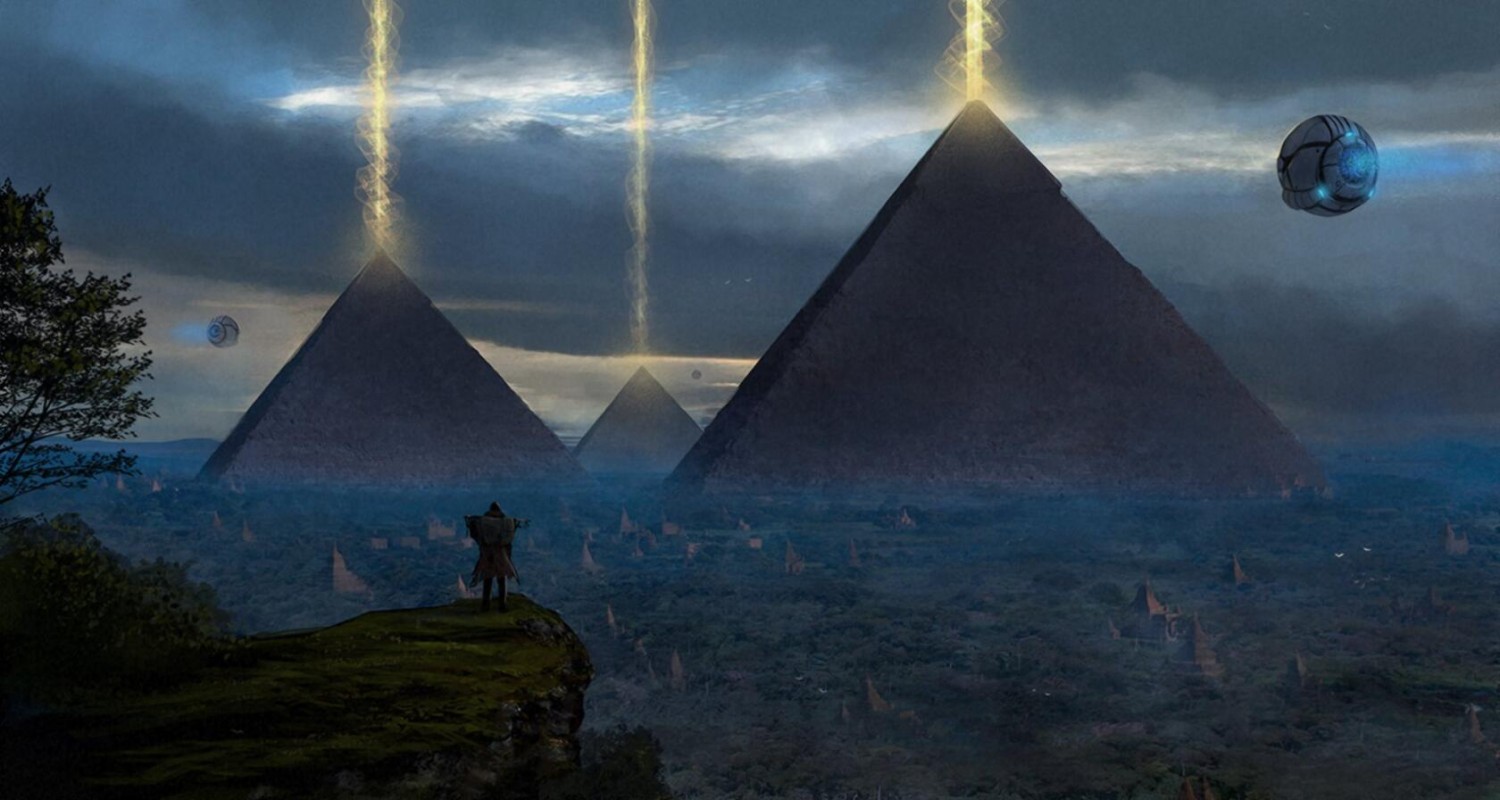Marcion of Sinope was a seismic force who rattled the foundations of a fledgling faith. In the second century, this wealthy shipowner and self-proclaimed reformer looked at the Old Testament, declared it incompatible with the teachings of Jesus, and set out to redefine Christianity. His radical ideas forced the early church to define itself in opposition to him, shaping the New Testament canon and Christian theology as we know it.
But Marcion’s influence didn’t stop there. His ideas echoed through Gnostic texts like the Apocalypse of Adam, a forbidden scripture that challenged the very nature of God and creation. Together, Marcion’s heresy and Gnostic writings reveal a hidden struggle at the heart of early Christianity—a battle over truth, power, and the divine.
Marcion | The Heretic Who Rewrote Christianity
Marcion wasn’t subtle. Born around 85 AD in what is now Turkey, he was a man of means and conviction. By the early 140s, he’d made his way to Rome, where he dropped a theological bombshell | the God of the Old Testament was not the same as the loving Father preached by Jesus. This wasn’t a minor quibble over doctrine—it was a direct challenge to the Jewish roots of Christianity. Marcion’s ideas were so explosive that they forced the church to act, excommunicating him in 144 AD and branding him the first major heretic. But his influence was far from over.
The Gospel According to Marcion
Marcion didn’t just critique the Old Testament; he rejected it outright. To him, the God of Moses—prone to wrath, demanding sacrifices, and issuing bizarre laws about food and clothing—was a far cry from the merciful deity Jesus described. Marcion argued that Jesus wasn’t the Jewish Messiah foretold by prophets but a divine emissary sent by a higher, previously unknown God to rescue humanity from the flawed creator of the material world.
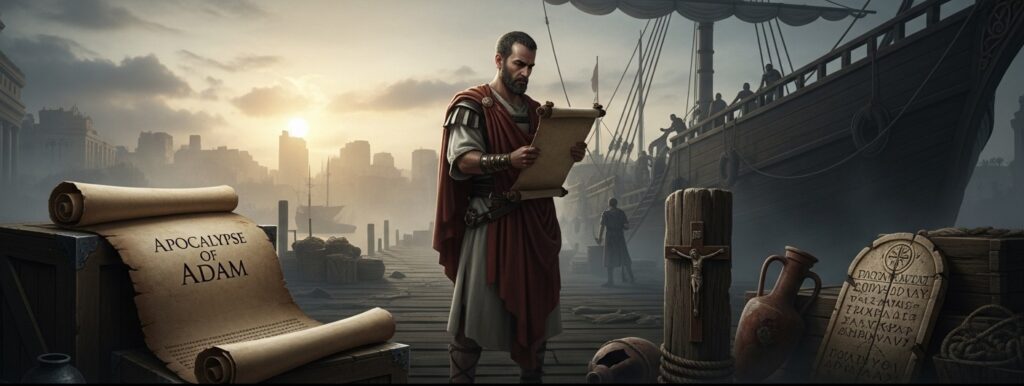
To support his theology, Marcion created his own scripture. He took the Gospel of Luke, stripped it of anything that tied Jesus to Jewish tradition, and paired it with ten of Paul’s letters, which he also heavily edited. In Marcion’s version, Jesus doesn’t have a birth story, a genealogy, or any connection to King David. Instead, he appears suddenly, fully divine, with no human origins. Gone are the Nativity, Mary, Joseph, and any hint of prophecy fulfillment. Marcion’s Jesus was a cosmic liberator, not a Jewish savior.
The Two-God Problem
At the core of Marcion’s theology was a bold claim | there were two gods. The God of the Old Testament, whom Marcion called the Demiurge, was a lesser, flawed being responsible for creating the material world—a world full of pain, suffering, and imperfection. In contrast, the true God, the Father of Jesus, was a transcendent deity of love and grace, untainted by the messiness of creation. This dualism wasn’t just philosophical; it was a direct attack on the unity of God central to Jewish and emerging Christian thought.
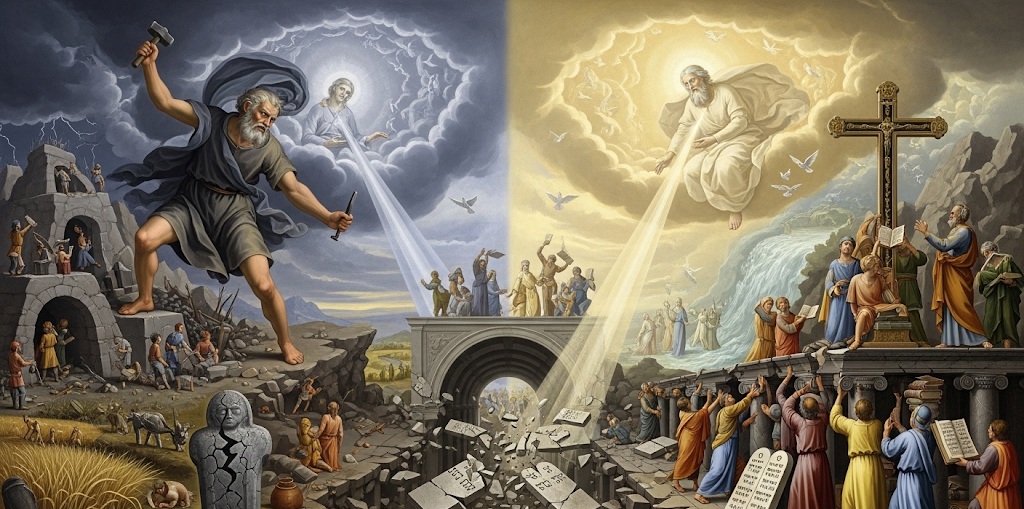
Marcion’s ideas horrified church leaders. If the Old Testament God wasn’t the Father of Jesus, the entire foundation of Christianity—its connection to Jewish scripture and tradition—crumbled. The church saw Marcion’s theology as a threat to its authority and coherence, labeling it heresy and launching a counteroffensive to preserve orthodoxy.
Marcion’s Lasting Impact on Christianity
Marcion forced the early church to define itself. His influence is evident in three key areas | the formation of the New Testament canon, the church’s relationship with the Old Testament, and the persistence of his ideas in modern Christianity.
Shaping the New Testament Canon
Before Marcion, Christian scriptures were a loose collection of texts with no agreed-upon canon. Marcion changed that. By compiling his own canon—a modified Gospel of Luke and select Pauline letters—he challenged the church to clarify which texts were authoritative. In response, early Christian leaders began the process of formalizing the New Testament, selecting texts that aligned with orthodox theology and countered Marcion’s influence. By the late second century, the four Gospels, Acts, and additional epistles were gaining acceptance, largely as a reaction to Marcion’s selective scripture.
In a twist of irony, the man branded a heretic helped give us the Bible as we know it. Without Marcion’s provocation, the church might have delayed or avoided the canonization process altogether.
Redefining the Old Testament’s Role
Marcion’s rejection of the Old Testament forced the church to grapple with its Jewish roots. Early Christians viewed Jesus as the fulfillment of Jewish prophecy, but Marcion’s dismissal of the Old Testament as irrelevant—or worse, the work of a lesser god—threatened that connection. In response, church fathers like Tertullian and Irenaeus defended the unity of the Old and New Testaments, arguing that the God of both was one and the same.
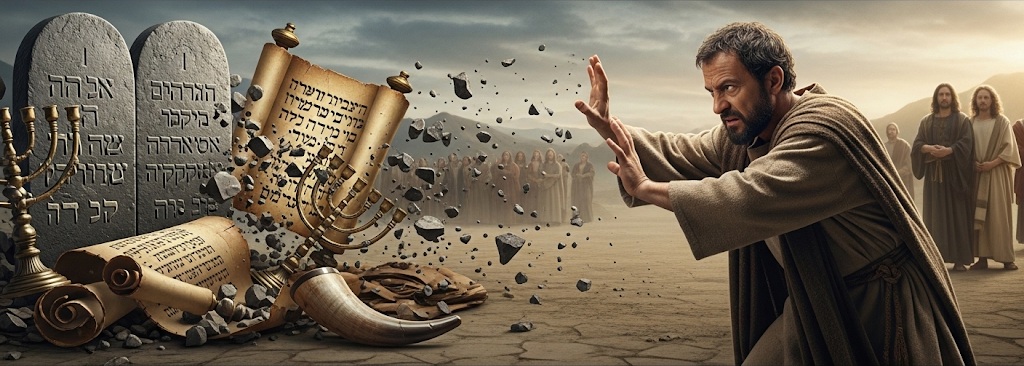
Yet Marcion’s influence lingers. Many modern Christians instinctively shy away from the Old Testament’s harsher passages, focusing instead on the New Testament’s message of love and forgiveness. When someone says, “That’s just the Old Testament—God’s different now,” they’re channeling Marcion, whether they know it or not.
Marcion’s Ghost in Modern Christianity
Marcion’s churches didn’t vanish after his excommunication. They thrived for centuries, attracting followers with their simple, radical message | Jesus saves, and the Old Testament’s rules don’t apply. While Marcionism eventually faded, its core ideas persist. The emphasis on Jesus as a figure of love, detached from the Old Testament’s legalism, resonates in many Christian denominations today. Marcion’s legacy is a quiet but persistent undercurrent in the faith he sought to redefine.
The Gnostic Connection | The Apocalypse of Adam
Marcion’s ideas aligned closely with Gnosticism, a diverse movement that challenged orthodox Christianity with its emphasis on secret knowledge (gnosis) and a dualistic view of the divine. One of the most striking Gnostic texts, the Apocalypse of Adam, discovered in 1945 among the Nag Hammadi manuscripts, echoes Marcion’s theology and reveals a hidden side of early Christian thought.
What Is the Apocalypse of Adam?
The Apocalypse of Adam is a Gnostic text purportedly written by Adam, the first man, to his son Seth. Unlike the Book of Genesis, which portrays Yahweh as the sole creator, this text claims the material world was crafted by a lesser deity—the Demiurge—while the true God remains transcendent and unknowable. Adam reveals to Seth a secret history of creation, describing a divine struggle between the true God’s light and the false rulers of the world.
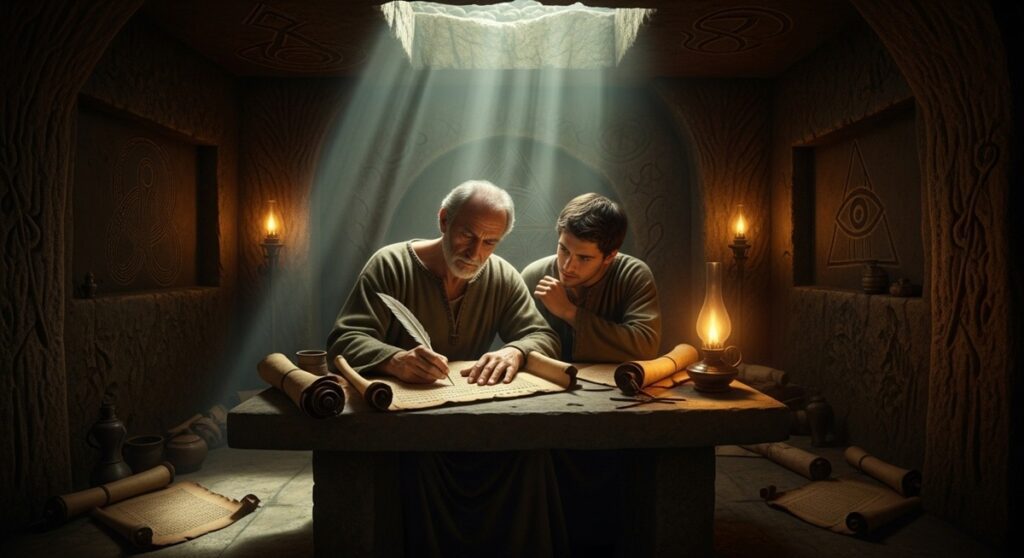
This text was banned by early church leaders, who saw its teachings as a direct threat to Christian orthodoxy. Its rediscovery in the 20th century offers a glimpse into the diversity of early Christian beliefs and the fierce debates that shaped the faith.
The Gnostic Revolt Against Orthodoxy
Gnosticism, like Marcionism, rejected the idea that the God of the Old Testament was the ultimate deity. In the Apocalypse of Adam, the Demiurge is portrayed as ignorant and arrogant, falsely claiming to be the only god. The true divine power, revealed through secret knowledge, lies beyond the Demiurge’s reach. This theology mirrors Marcion’s belief in a flawed creator god and a higher, loving deity.
Early church fathers, including Irenaeus and Tertullian, condemned Gnostic texts as heretical, leading to their suppression and destruction. The Apocalypse of Adam survived only by chance, hidden in a clay jar in Egypt for over 1,600 years. Its rediscovery challenges the narrative of a unified early Christianity, revealing a faith fractured by competing visions of God and salvation.
The Hidden God and the Demiurge
The Apocalypse of Adam goes further than Marcion by explicitly rejecting the Genesis account. It claims that three divine beings reveal to Adam the existence of a higher God, beyond the Demiurge’s control. This true God sends a liberator—not explicitly Jesus, but a figure who frees humanity from the Demiurge’s lies. The text’s radical theology undermines the Judeo-Christian belief in a single, omnipotent creator, suggesting that salvation comes through knowledge, not blind faith.
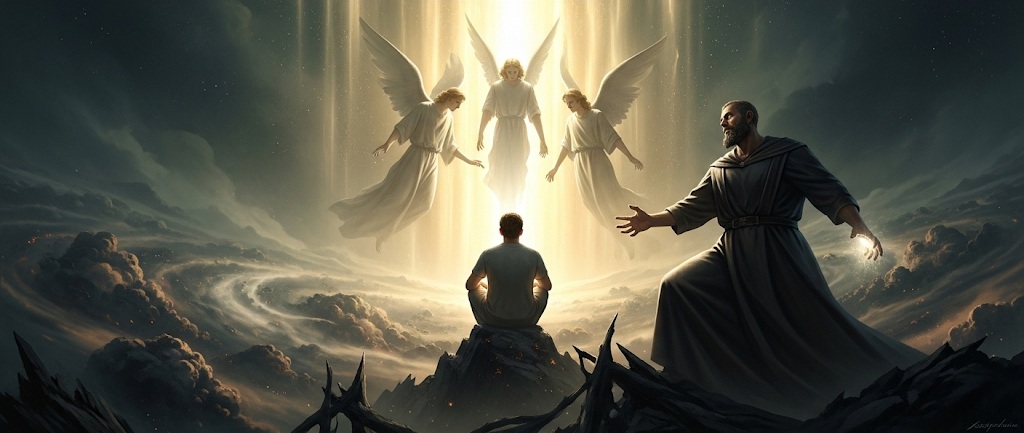
Such ideas were anathema to early church leaders. By challenging the authority of the Old Testament and the church’s hierarchy, Gnostic texts like the Apocalypse of Adam threatened the fragile unity of Christianity. Their suppression wasn’t just theological—it was political, aimed at consolidating power in the hands of bishops and orthodox teachers.
Marcion and the Apocalypse of Adam
Marcion and the Apocalypse of Adam raise timeless questions about faith, scripture, and the nature of God. Was the Old Testament’s God truly the same as Jesus’ Father? Is the Bible the unerring word of God, or a collection of texts shaped by human agendas? And what happens when hidden truths—like those in the Apocalypse of Adam—challenge centuries of doctrine?
The Power of Heresy
Marcion’s heresy forced the church to define its beliefs, proving that dissent can shape history as much as orthodoxy. Without Marcion, the New Testament might not exist in its current form, and the church’s relationship with the Old Testament might have evolved differently. Heresy, it turns out, is a catalyst for change.
The Rediscovery of Gnostic Texts
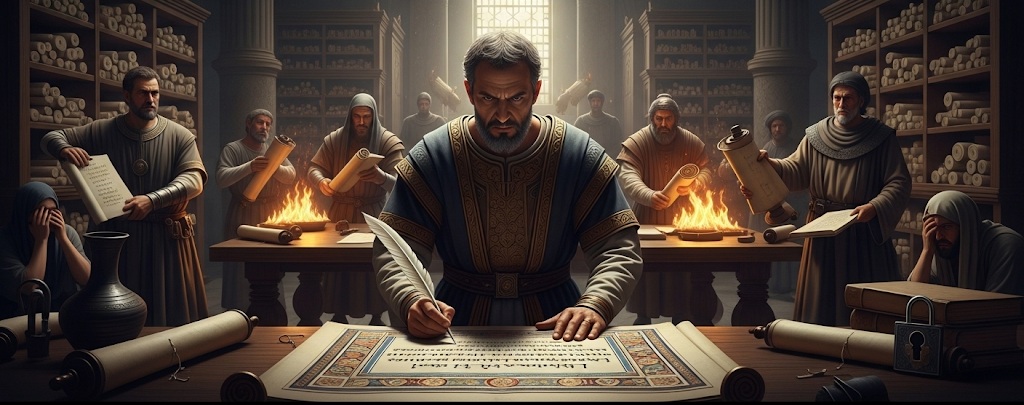
The Apocalypse of Adam reminds us that history is written by the victors. The early church’s decision to suppress Gnostic texts wasn’t just about theology; it was about control. By silencing alternative voices, church leaders crafted a narrative of unity that obscured the diversity of early Christianity. The Nag Hammadi discovery challenges that narrative, inviting us to reconsider what we think we know about the faith’s origins.
A Modern Echo
Today, Marcion’s influence lingers in the unease many Christians feel toward the Old Testament’s harsher passages. The Apocalypse of Adam resonates with those who question institutional religion and seek spiritual truth beyond dogma. In an age when information is harder to suppress, these ancient texts remind us that faith is a journey, not a destination—and that the truth may be more complex than we’ve been led to believe.
The Legacy of Marcion and Gnosticism
Marcion and the Apocalypse of Adam represent a pivotal moment in Christian history—a time when the faith could have taken a different path. Marcion’s radical vision of a Christianity free from the Old Testament forced the church to define its scriptures and theology. The Apocalypse of Adam, with its Gnostic rejection of the creator god, challenged the very foundations of Judeo-Christian belief. Together, they reveal a Christianity far more diverse and contentious than the unified faith later generations inherited.







